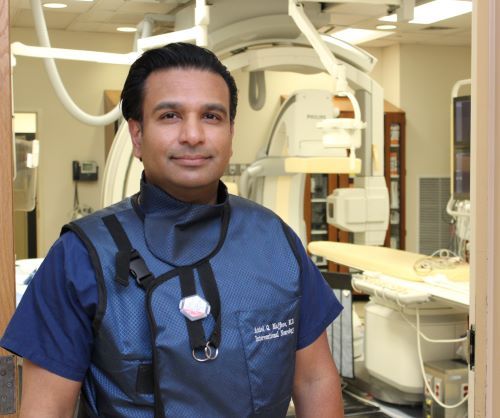Author: Sherry Farney
Luck, faith, and clinical expertise all came together for Kathy Escue on Thursday, June 5, 2025. That evening, while on her way home from watching her granddaughter’s honors night celebration at Davison High School, she remembers being stopped at a red light when something suddenly felt wrong on the left side of her body. Her foot came off the brake, and she started crossing all five lanes of M-15. No one hit her vehicle, but it only stopped after crossing a curb and hitting a tree. Someone in a car behind her at the light called 9-1-1, and first responders arrived soon after. Her son and daughter, who had been heading home from the celebration the same way, also arrived at the scene.
“I remember someone asking me to open my driver’s side door, and I had to use my right hand to push the button on my key fob, because my left side wasn’t working,” said Kathy. “The first responders got me out, evaluated me, and said I was having a stroke. They recommended I go by ambulance to McLaren Flint. I was unsure, but they were very adamant, so I agreed.”
Kathy arrived at the hospital and was taken to the ER’s designated stroke room. She was evaluated by the ER staff and by Caroline Powell, a nurse practitioner specializing in the care of stroke patients. Caroline’s evaluation triggered a call to interventional neurologist Aniel Majjhoo, medical director of neurosciences for McLaren Health Care. Kathy had left-sided facial droop, slurred speech, left-sided weakness, and her condition was deteriorating quickly.
She had a clot blocking blood flow to her brain. Her family was informed she was a good candidate for Tenecteplase, a clot-busting drug, and they had to decide quickly if they wanted her to have it, as it needs to be given within a strict period of time after the first signs of stroke. Her son and daughter gave permission for her to receive the medication, and then she was prepped for the neuro catheterization lab, where Dr. Majjhoo would remove the clot. A family of strong faith, Kathy’s son started a prayer chain for her.
“When I got to the lab, Kathy’s deficits were clearing very fast, which meant the Tenecteplase was breaking up the clot,” said Dr. Majjhoo. “My evaluation was that she no longer needed an intervention, and I went to find her family and tell them the good news. They were very relieved and surprised. I let them see her as soon as it was appropriate because they couldn’t believe it. Within a couple of hours, Kathy was sitting up, talking, and there were no more issues with her left side. It’s a best-case outcome for everyone.”
It turns out, a piece of a blood clot located in the back of her heart dislodged, and caused the stroke. She’s now seeing a cardiologist to ensure it doesn’t cause her any further trouble.
“I know how lucky I am,” said Kathy. “I had to stay in the neuro ICU for a week to recover and realized how much worse things could have been for me. As soon as I was off restrictions, I started playing golf again a couple of times a week and planning trips to our cabin in northern Michigan. I am so thankful for my family's faith and that medicine. I like to keep busy, and I’ve got many more memories to make.”

McLaren Flint recently received the American Heart Association’s 2025 Get With The Guidelines® Stroke GOLD PLUS quality achievement award for its commitment to ensuring stroke patients receive the most appropriate treatment according to nationally recognized, research-based guidelines, ultimately leading to more lives saved and reduced disability. In addition, the hospital is the region’s only Comprehensive Stroke Center. To learn the signs of stroke or join one of our education and support group sessions, visit mclaren.org/flintstroke.